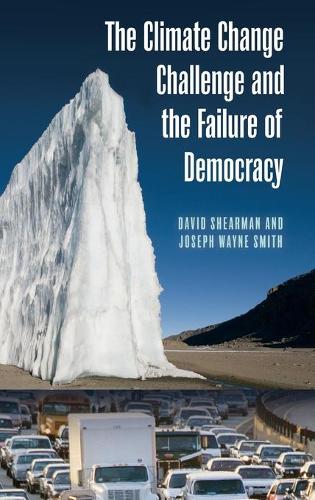
The Climate Change Challenge and the Failure of Democracy
(Hardback)
Publishing Details
The Climate Change Challenge and the Failure of Democracy
By (Author) David Shearman
By (author) Joseph Wayne Smith
Bloomsbury Publishing PLC
Praeger Publishers Inc
30th August 2007
United States
Classifications
Professional and Scholarly
Non Fiction
Political structures / systems: democracy
Central / national / federal government policies
363.73874
Physical Properties
Hardback
208
Width 156mm, Height 235mm
454g
Description
This provocative book presents compelling evidence that the fundamental problem behind environmental destructionand climate change in particularis the operation of liberal democracy. Climate change threatens the future of civilization, but humanity is impotent in effecting solutions. Even in those nations with a commitment to reduce greenhouse emissions, they continue to rise. This failure mirrors those in many other spheres that deplete the fish of the sea, erode fertile land, destroy native forests, pollute rivers and streams, and utilize the world's natural resources beyond their replacement rate. In this provocative book, Shearman and Smith present evidence that the fundamental problem causing environmental destructionand climate change in particularis the operation of liberal democracy. Its flaws and contradictions bestow upon governmentand its institutions, laws, and the markets and corporations that provide its sustenancean inability to make decisions that could provide a sustainable society. Having argued that democracy has failed humanity, the authors go even further and demonstrate that this failure can easily lead to authoritarianism without our even noticing. Even more provocatively, they assert that there is merit in preparing for this eventuality if we want to survive climate change. They are not suggesting that existing authoritarian regimes are more successful in mitigating greenhouse emissions, for to be successful economically they have adopted the market system with alacrity. Nevertheless, the authors conclude that an authoritarian form of government is necessary, but this will be governance by experts and not by those who seek power. There are in existence highly successful authoritarian structuresfor example, in medicine and in corporate empiresthat are capable of implementing urgent decisions impossible under liberal democracy. Society is verging on a philosophical choice between liberty or life. But there is a third way between democracy and authoritarianism that the authors leave for the final chapter. Having brought the reader to the realization that in order to halt or even slow the disastrous process of climate change we must choose between liberal democracy and a form of authoritarian government by experts, the authors offer up a radical reform of democracy that would entail the painful choice of curtailing our worldwide reliance on growth economies, along with various legal and fiscal reforms. Unpalatable as this choice may be, they argue for the adoption of this fundamental reform of democracy over the journey to authoritarianism.
Reviews
"Arriving at a time when governments, corporations and consumers are bragging about their voluntary emission reduction steps, this book judges current and pending efforts as failures, and moves the discussion to the next phase. For conversion to sustainable societies, liberal democracy must give way to "a form of authoritarian government by experts" which the authors sketch out at the end. This is an argument-moving book, a fresh and audacious contribution to the climate change debate."-Otis L. Graham, University of California, Santa Barbara (Emeritus)
"For those wanting to think outside the square on climate change issues, this book is indispensable."-Bob Birrell, Director of the Centre for Population and Urban Research at Monash University
"The partnership of philosopher and ecologist Joseph Wayne Smith with emeritus professor of medicine David Shearman has produced an analysis that covers the gamut from governance in a liberal democracy to a treatise on banking institutions. The authors conclude that the environmental goods necessary to sustain civilization will collapse unless humanity's "loving marriage to economic growth" can be sundered."-Virginia Deane Abernethy, Emeritus Professor, Vanderbilt University School of Medicine
"This is a provocative book. Many will disagree with its conclusions, but the dilemma it points to is real and cannot be ignored."-Dr. Katharine Betts, Associate Professor Sociology, Swinburne University of Technology
"Warnings of a pending environmental crisis are no longer the prerogative of solitary prophets. They now reflect the consensus of the scientific establishment. But how radical a change in established political thinking do they require of us This volume makes a powerful case for the view that taking environmental crisis seriously implies a radical critique of democracy itself, and a willingness to accept government by qualified expertise rather than popular election. If political thinking at its best makes the pressing questions of the day an occasion to revisit cherished fundamentals, then this book qualifies."-Gordon Graham, Henry Luce III Professor of Philosophy and the Arts at Princeton Theological Seminar
Author Bio
David Shearman is a physician and scientist who has held positions on faculty at Edinburgh and Yale University Medical Schools and as Mortlock Professor of Medicine at Adelaide University. He is currently working on several aspects of health and climate change. As a practicing physician he has maintained a lifelong interest in the environment and its relationship to human health. Joseph Wayne Smith is a lawyer and philosopher with a research interest in environmentalism. He is the author of Global Meltdown (Praeger, 1998) and Healing in a Wounded World (Praeger, 1997), among other books on the future of human civilization.
